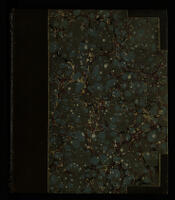In the college examination the entire first and second classes in the second year are on Monk's side as are 17 out of 25 in the first two classes of the first year, Lord Brecknock in the third class, William Clark has so much support for the Chair of Anatomy that Dr Woodhouse has withdrawn his candidacy, "disgusted beyond all description" by Samuel Parr
On the spine is stamped ‘LETTERS OF LORD BYRON 1813–14’.
Zonder titelCambridge - WC went to the library to see if he could find the books he mentioned to WW. He could not get Treviranus's works [Gottf. Reinhold Treviranus?] - perhaps WW has them, if not he will send him his own copies. Has sent 'a volume of Jacobi [Fried. Hein. Jacobi?] - most probably you are acquainted with it - containing criticisms on Herder's [Joh. Gottf. Von Herder?] opinions concerning instinct, etc'.
Cambridge - SWC to send WW 'the 3rd Vol of Hildebrandt's Anatomy by Weber' and 'a vol. of Treviranus's last work - by which I can well perceive that he has by no means given in his adhesion to Bell's system'.
Cambridge - Charles Darwin's 'discoveries in fossil zoology' are 'of the greatest interest and value. His Toxodon, as Mr Owen proves, supplies a most desirable step connecting the rodentia with the [paetry dermete] pretty nearly, and with the cetacea more remotely. He contributes therefore to the completion of the zoological scale fast in the parts where it is weakest and most imperfect'.
Cambridge - WC has read 'your three sheets on the Philosophy of Biology' with 'much pleasure'. WW should give more consideration to Haller [Albrecht von Haller?]. He 'set about determining the properties of the various organic textures'. Bichat [Marie Franc. Bichat?] did much which Haller left undone. 'The vital properties of the living tissues studied in connection with the stimuli which incite their action, (whether these be internal or from external nature,) are the foundation of modern Physiology'. WC thinks that WW should 'dispose of the 'Vital Principle'' in his sequel; 'its assumption [is] of no use - and not philosophical: and if you think so too, it might be well clearly to show (as you can) how its rejection is not materialism in the irreligious sense of the term'. It is a subject which has now agitated a great deal of physiological discussions.
Cambridge - WC received the 'greatest pleasure' perusing the sheet WW sent him - particularly his remarks on instinct. Must rest satisfied that the Final Cause 'controls the separate minor forces'. This part of WW's work will be of great service to medical men.
Cambridge - WC returns the fourth sheet: 'I think section 3 excellent: and so in general the rest'. WC has two objections: 'It appears that the successive teeth of the Crocodile can scarcely be compared with the germs of new creatures included within germs - because each of the germs of the teeth which are, in succession, to take the place of any existing tooth, is included in a common membrane. So that the successive teeth would rather bear an analogy to members of the same family, than to consecutive generations'. Secondly, physiologists like Dr Marshall Hall will not like 'your distinction between the animal and organic powers'. WC looks forward to the way WW 'will establish the one controlling power, which must keep all the separate vital forces in order - as I presume you must according to your plan, as far as I see it'.
WC returns WW's sheet and also sends him 'the work of a modern of great repute...you will see his opinion of Final Causes not as of a principle inadmissible in Biology - but as too limited'. Would like to know WW's opinion when he has had time to look at Valentin's work [Gabriel G. Valentin] - 'You will probably think them too misty and indefinite'.
Written from Cambridge.
Monk's mother's report of her meeting with Jane, supporting William Clark for the Chair of Anatomy, cannot attend Blomfield's christening due to the election, dined with Samuel Parr
